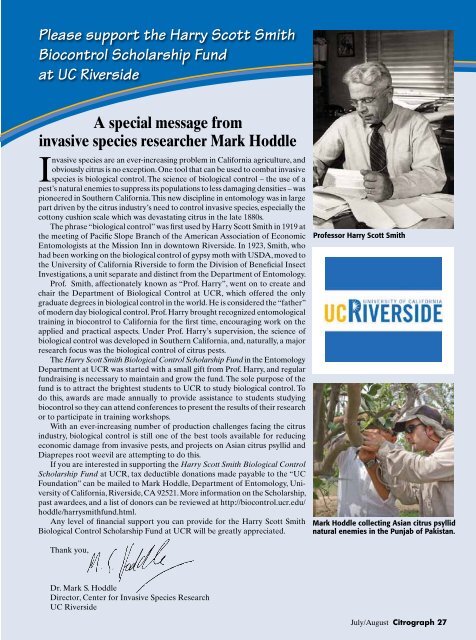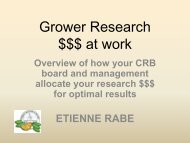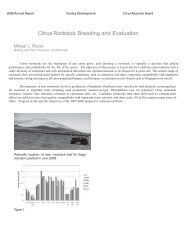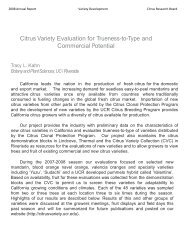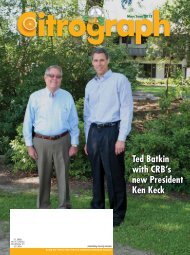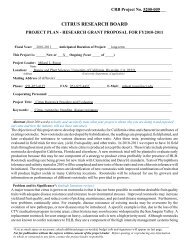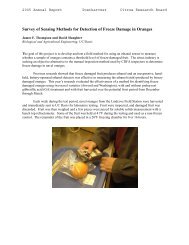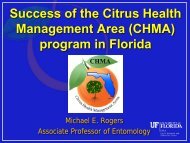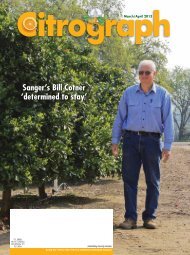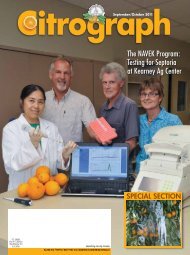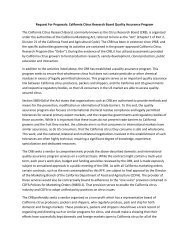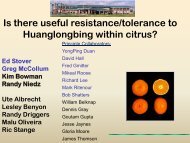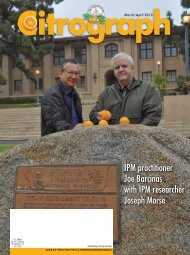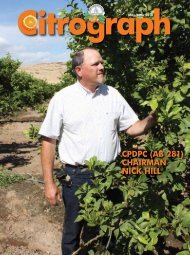Beth Grafton-Cardwell and her team at Lindcove - Citrus Research ...
Beth Grafton-Cardwell and her team at Lindcove - Citrus Research ...
Beth Grafton-Cardwell and her team at Lindcove - Citrus Research ...
Create successful ePaper yourself
Turn your PDF publications into a flip-book with our unique Google optimized e-Paper software.
Please support the Harry Scott Smith<br />
Biocontrol Scholarship Fund<br />
<strong>at</strong> UC Riverside<br />
A special message from<br />
invasive species researc<strong>her</strong> Mark Hoddle<br />
Invasive species are an ever-increasing problem in California agriculture, <strong>and</strong><br />
obviously citrus is no exception. One tool th<strong>at</strong> can be used to comb<strong>at</strong> invasive<br />
species is biological control. The science of biological control – the use of a<br />
pest’s n<strong>at</strong>ural enemies to suppress its popul<strong>at</strong>ions to less damaging densities – was<br />
pioneered in Sout<strong>her</strong>n California. This new discipline in entomology was in large<br />
part driven by the citrus industry’s need to control invasive species, especially the<br />
cottony cushion scale which was devast<strong>at</strong>ing citrus in the l<strong>at</strong>e 1880s.<br />
The phrase “biological control” was first used by Harry Scott Smith in 1919 <strong>at</strong><br />
the meeting of Pacific Slope Branch of the American Associ<strong>at</strong>ion of Economic<br />
Entomologists <strong>at</strong> the Mission Inn in downtown Riverside. In 1923, Smith, who<br />
had been working on the biological control of gypsy moth with USDA, moved to<br />
the University of California Riverside to form the Division of Beneficial Insect<br />
Investig<strong>at</strong>ions, a unit separ<strong>at</strong>e <strong>and</strong> distinct from the Department of Entomology.<br />
Prof. Smith, affection<strong>at</strong>ely known as “Prof. Harry”, went on to cre<strong>at</strong>e <strong>and</strong><br />
chair the Department of Biological Control <strong>at</strong> UCR, which offered the only<br />
gradu<strong>at</strong>e degrees in biological control in the world. He is considered the “f<strong>at</strong><strong>her</strong>”<br />
of modern day biological control. Prof. Harry brought recognized entomological<br />
training in biocontrol to California for the first time, encouraging work on the<br />
applied <strong>and</strong> practical aspects. Under Prof. Harry’s supervision, the science of<br />
biological control was developed in Sout<strong>her</strong>n California, <strong>and</strong>, n<strong>at</strong>urally, a major<br />
research focus was the biological control of citrus pests.<br />
The Harry Scott Smith Biological Control Scholarship Fund in the Entomology<br />
Department <strong>at</strong> UCR was started with a small gift from Prof. Harry, <strong>and</strong> regular<br />
fundraising is necessary to maintain <strong>and</strong> grow the fund. The sole purpose of the<br />
fund is to <strong>at</strong>tract the brightest students to UCR to study biological control. To<br />
do this, awards are made annually to provide assistance to students studying<br />
biocontrol so they can <strong>at</strong>tend conferences to present the results of their research<br />
or to particip<strong>at</strong>e in training workshops.<br />
With an ever-increasing number of production challenges facing the citrus<br />
industry, biological control is still one of the best tools available for reducing<br />
economic damage from invasive pests, <strong>and</strong> projects on Asian citrus psyllid <strong>and</strong><br />
Diaprepes root weevil are <strong>at</strong>tempting to do this.<br />
If you are interested in supporting the Harry Scott Smith Biological Control<br />
Scholarship Fund <strong>at</strong> UCR, tax deductible don<strong>at</strong>ions made payable to the “UC<br />
Found<strong>at</strong>ion” can be mailed to Mark Hoddle, Department of Entomology, University<br />
of California, Riverside, CA 92521. More inform<strong>at</strong>ion on the Scholarship,<br />
past awardees, <strong>and</strong> a list of donors can be reviewed <strong>at</strong> http://biocontrol.ucr.edu/<br />
hoddle/harrysmithfund.html.<br />
Any level of financial support you can provide for the Harry Scott Smith<br />
Biological Control Scholarship Fund <strong>at</strong> UCR will be gre<strong>at</strong>ly appreci<strong>at</strong>ed.<br />
Thank you,<br />
Dr. Mark S. Hoddle<br />
Director, Center for Invasive Species <strong>Research</strong><br />
UC Riverside<br />
Professor Harry Scott Smith<br />
Mark Hoddle collecting Asian citrus psyllid<br />
n<strong>at</strong>ural enemies in the Punjab of Pakistan.<br />
July/August Citrograph 27


